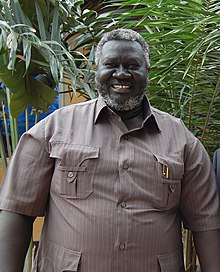Malik Agar (Arabic: مالك عقار, romanized: Mālik ʻAqqār; born Nganyofa Agar Eyre Nganyofa[4][5]) is a Sudanese politician and former insurgent leader who was active in the insurgency in Blue Nile state. Since 2023, he has been the deputy chairman of the Transitional Sovereignty Council, Sudan's ruling military junta.[6]
Malik Agar | |
|---|---|
مالك عقار | |
 Agar in 2009 | |
| Deputy Chairman of the Transitional Sovereignty Council | |
| Assumed office 19 May 2023 | |
| Chairman | Abdel Fattah al-Burhan |
| Preceded by | Hemedti |
| Member of the Transitional Sovereignty Council | |
| Assumed office 11 November 2021 | |
| In office 2 February 2021 – 25 October 2021 | |
| Chairman of the SRF | |
| Assumed office February 2012 | |
| Chairman of SPLM-N | |
| Assumed office February 2011 | |
| Governor of Blue Nile State | |
| In office April 2010 – 2 September 2011 | |
| Personal details | |
| Born | Nganyofa Agar Eyre Nganyofa Ingessana Hills, Blue Nile State, Republic of Sudan |
| Political party | SPLM-N |
| Occupation | Politician, soldier |
| Military service | |
| Allegiance | Sudan People's Liberation Movement |
| Years of service | 1983–present |
| Battles/wars | Second Sudanese Civil War Sudanese conflict in South Kordofan and Blue Nile War in Sudan (2023–present) |
Early life
editMalik Agar was born Nganyofa Agar Eyre Nganyofa to an Ingessana chief in Blue Nile State. He did not know he was a Muslim until he was eight. His headteacher gave him the name "Malik" and told him he was a Muslim. From then on, he was called "Malik Agar Eyre".[4][5]
Second Sudanese Civil War
editAgar joined the Sudanese armed opposition shortly after the beginning of the Second Sudanese Civil War in 1983.[7]
In the 1990s, he was the commander of a section of the Sudan People's Liberation Movement (SPLM) military forces along the Ethiopia–Sudan border south of the Blue Nile to Geissan.[8] SPLM units under his command captured the towns of Kurmuk and Qaissan in 1997.[7]
Agar was close to John Garang, and shared his goal of overthrowing the Government of Sudan, as opposed to fighting for the secession of South Sudan. After Garang's death, Agar, along with others who shared a desire for a revolution in Sudan, were marginalised by the new SPLM leadership. Agar expressed his disapproval of the secession of South Sudan to a US official in 2009, stating that it would cause the eventual splintering of the rest of Sudan.[7]
Post-Civil War
editHe was elected governor of Blue Nile State in the Republic of the Sudan in April 2010.[9][10] Agar was one of the few high-profile members of the Sudanese opposition to run in the election, and was the only non-National Congress Party (NCP) candidate to win a governorship. Agar defeated the NCP candidate, Farah Ibrahim Mohamed Al-Aggar, by 108,119 to 99,417 votes.[7]
In February 2011 Malik Agar also became chairman of the Sudan People's Liberation Movement–North, the part of the SPLM that operates in northern Sudan. The southern portion of the SPLM became a separate political party in South Sudan when the country seceded from the Republic of Sudan in July 2011.[11]
On 2 September, Agar was deposed as governor on the orders of President Omar al-Bashir. He fled to the southern part of the state and was reportedly planning a counterattack. He warned that the Sudan–SPLM conflict may ignite a wider Sudanese civil war.[12]
In February 2012 Agar helped found the Sudanese Revolutionary Front (SRF); a coalition of Sudanese opposition groups that aims to overthrow the Sudanese government and replace it with a democracy.[7] In February 2012, Agar was elected president of the SRF.[13]
On 2 February 2021, he was appointed as a member of the Sovereignty Council of Sudan.[14]
Ideology
editAgar rejects President Omar al-Bashir's vision of an Arab-Islamic state, and has argued instead for a multicultural civil democracy.[7]
References
edit- ^ "H. E. Malik Agar Eyre". Wilson Center.
- ^ "Arrival of Commander Malik Agar, Vice president of the Transitional Sovereignty Council, to the Blue Nile State. He was received by Governor Ahmed Al-Amada of the Blue Nile State, along with several members of the regional government, leaders of the People’s Army, and political and community leaders.". 9 April 2024. blnews.net. Brown Land News.
- ^ "SPLM-North Agar faction fires secretary-general". 10 June 2021. radiotamazuj.org/en. Radio Tamazuj
- ^ a b A Poisonous Thorn in Our Hearts: Sudan and South Sudan's Bitter and Incomplete Divorce. Hurst. June 2014. ISBN 9781849044929.
- ^ a b "Sudan's Spreading Conflict (II): War in Blue Nile" (PDF). International Crisis Group.
- ^ "Sudan's Burhan dismisses Hemedti of his position". Al Bawaba. Retrieved 2023-05-19.
- ^ a b c d e f "Malik Aggar Eyre Gandof". Sudan Tribune. Archived from the original on 20 July 2013. Retrieved 6 May 2013.
- ^ Young, John (1999). "Along Ethiopia's Western Frontier: Gambella and Benishangul in Transition". The Journal of Modern African Studies. 37 (2): 321–346. ISSN 0022-278X – via JSTOR.
- ^ "SPLM celebrates victory in Blue Nile State" Archived 2010-12-24 at the Wayback Machine, Official website of the Sudan People's Liberation Moverment (accessed 21 March 2011)
- ^ "Blue Nile State". Archived from the original on 2012-03-07. Retrieved 2012-03-07.
- ^ "Malik Aggar to head SPLM in the north" Archived 2016-03-05 at the Wayback Machine, Official website of the Sudan People's Liberation Moverment (accessed 21 March 2011)
- ^ "Sudan declares emergency in Blue Nile state". Al Jazeera English. 3 September 2011. Archived from the original on 4 September 2011. Retrieved 3 September 2011.
- ^ "SRF Sudan". Archived from the original on 2020-04-13. Retrieved 2020-04-13.
- ^ "Sudan Sovereignty Council gains three new members under El Burhan". Radio Dabanga. Archived from the original on 2023-01-18. Retrieved 2023-01-19.